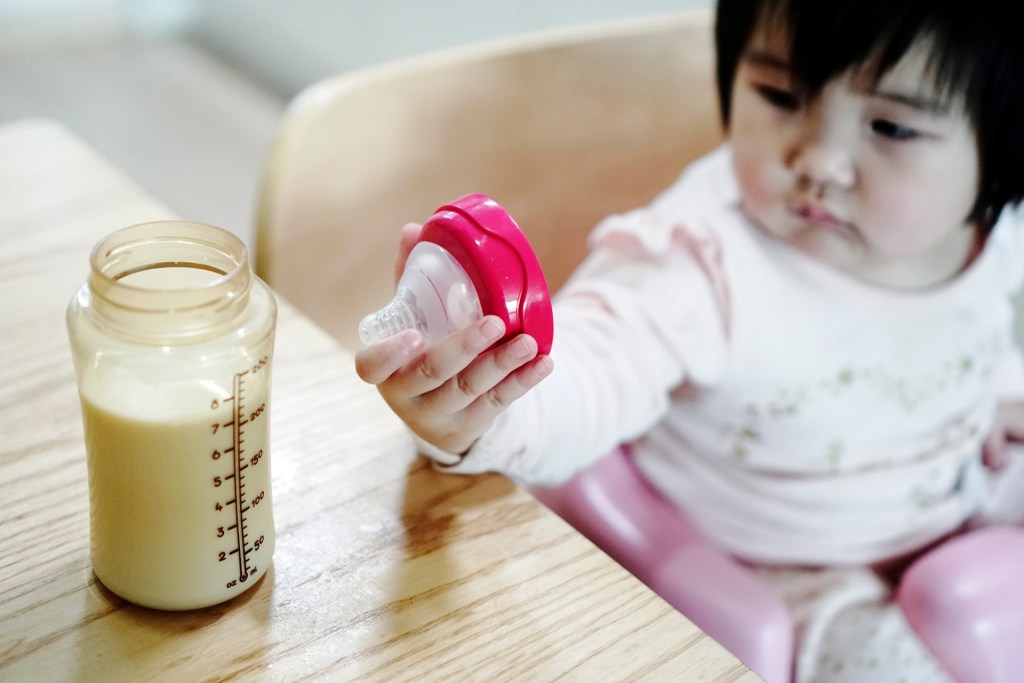Constipation in babies can sometimes feel like an extremely helpless situation for parents. Recognizing when their child is uncomfortable takes a little skill, as well, since infants unfortunately cannot easily communicate their discomforts to us more clearly. Dealing with an unhappy little one takes precedence over everything else and can exhaust moms and dads’ knowledge quickly.
Because of this, and the tendency for situations with sick children to escalate more quickly, parents often self-research out of desperation to find treatments to aid their ailing child. But before reaching for your car keys, there are a few things that should be discussed before deciding a course of treatment for your discomforted baby.

Is my baby really constipated?
Some new parents are not as skilled in recognizing the certain types of cries that may come from their bundles of joy. That being said, all parents inherently know when there is something very wrong with their child. There is a certain type of cry, incessant in nature, that makes the hairs on the backs of their necks stand up, while at the same time knowing deep down that something is very wrong with their children.
Those types of cries are the ones that can alert parents to certain gastrointestinal (GI) issues that may be brewing down in their little bellies. Crying that lasts longer than normal, extreme pain or visual discomfort when passing stool, and hard or pellet-like stools are typical signs that can strike fear into the hearts of parents. A few other signs to look for are:
- Arching of the back, or more of an arch than normal when your baby is passing stool
- Frequent, very liquid-like stools, indicating a blockage that is struggling to pass
- A prolonged or abnormally long period between passing stool
- Frequent “spitting up”

I think my baby is constipated. How could this happen?
When it comes to lack of movement in the bowel department, babies who are breastfed rarely struggle with constipation. Because breastfeeding moms are creating their babies’ food, their bond allows breastfeeding moms’ bodies to adjust the nutrients their babies need each day — thus assisting their babies’ digestive tracts through their breast milk.
Formula-fed babies are digesting a food source that is very different than breast milk. Looking at the two liquids side by side, it is visually obvious that breast milk is much thinner and more translucent than formula. Because of its added thickness, some babies have a more difficult time passing the formula easily. It can even build in the digestion process, causing more compact and painful bowel movements (BMs) for your little one.
My baby is definitely constipated. Now what do I do?
If your little one is a consumer of formula and has really been struggling with BMs over the course of a week with little to no improvement in their situation, chances are they are backed up and will need some kind of intervention to relieve the pain and pressure. There are a few pediatrician-approved home remedies that parents can try if they feel confident enough to do so.
However, it is very much recommended that if you are unsure of what to do, feel overwhelmed, or sense real urgency and panic in your child’s behavior, to please take them to an urgent-care facility or emergency room setting to be evaluated immediately.
Utilizing pear, prune, or apple juice to help relieve your little one’s discomfort is a great and inexpensive way to try a more natural approach. For babies 4 to 8 months old, 2 to 4 ounces of juice is recommended, while 6 ounces is the recommended amount for babies over 8-12 months of age. The natural sugars in those juices help push through the blockage, aiding it in exiting the area quickly.
An important note to make is that while formula-fed babies do become constipated more often than their breastfed counterparts, there is not one formula in particular that causes the big C more than another. The urban myth that sensitive formulas can cause constipation is nothing more than just that — a myth. It’s also not recommended that parents switch formulas frequently either, as this can exacerbate the digestive issues your baby is already having and could compound the issue further.
In any event, any significant changes with your baby should be discussed with their pediatrician. The physician who knows your child best can help relieve your worry and concern while guiding you through the process with practical tips and treatments to help your uncomfortable baby relax and prevent future constipation emergencies.
While most constipation issues are mild and minor, your child’s doctor will likely check more deeply for medical reasons for their pain such as milk allergies, celiac disease (gluten intolerance), lactose intolerance, acid reflux, or gastroesophageal reflux disease (GERD). Once these more serious issues have been ruled out, parents and pediatricians can go to work addressing the underlying constipation and come up with a joint effort and plan to treat and prevent further flare-ups.



